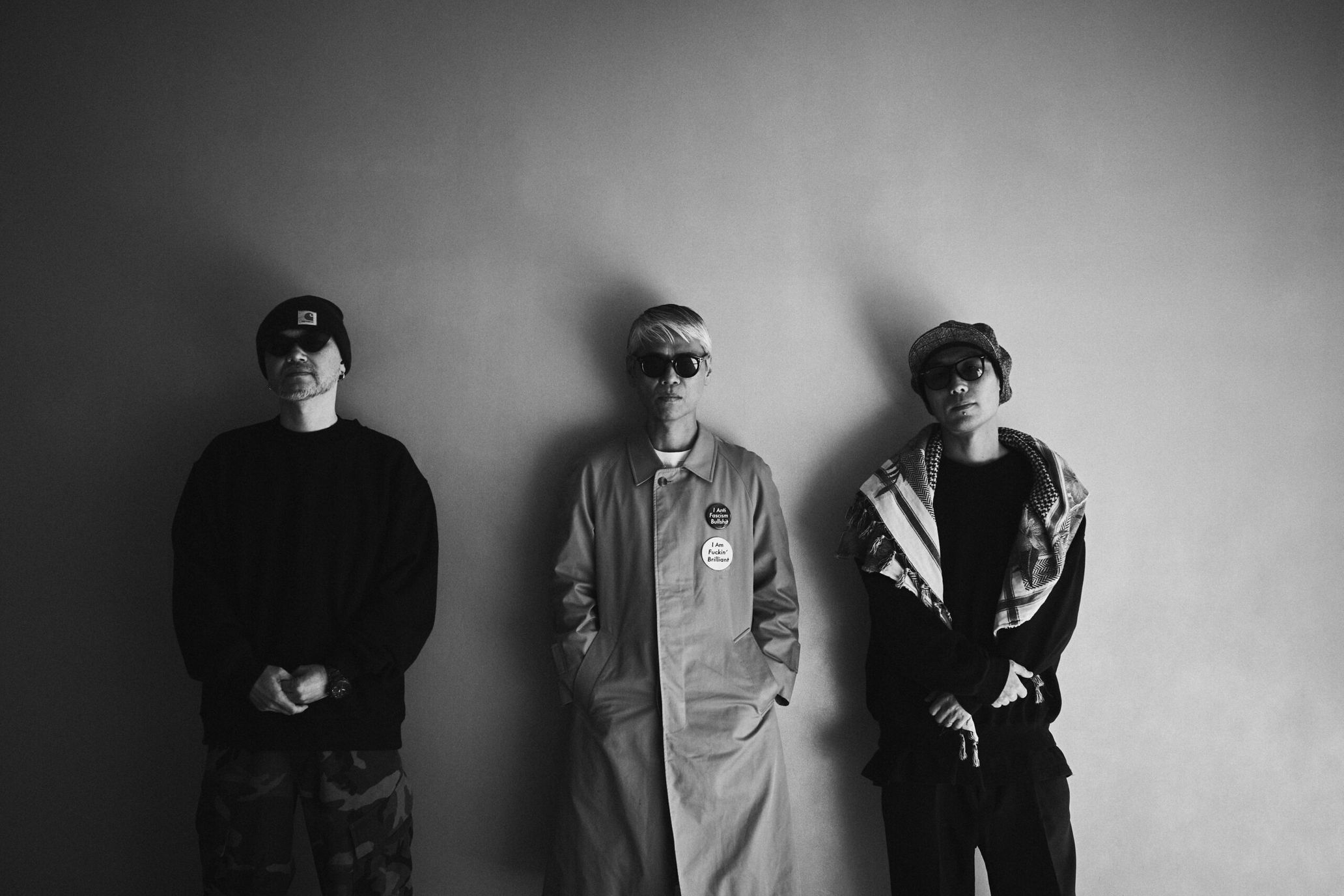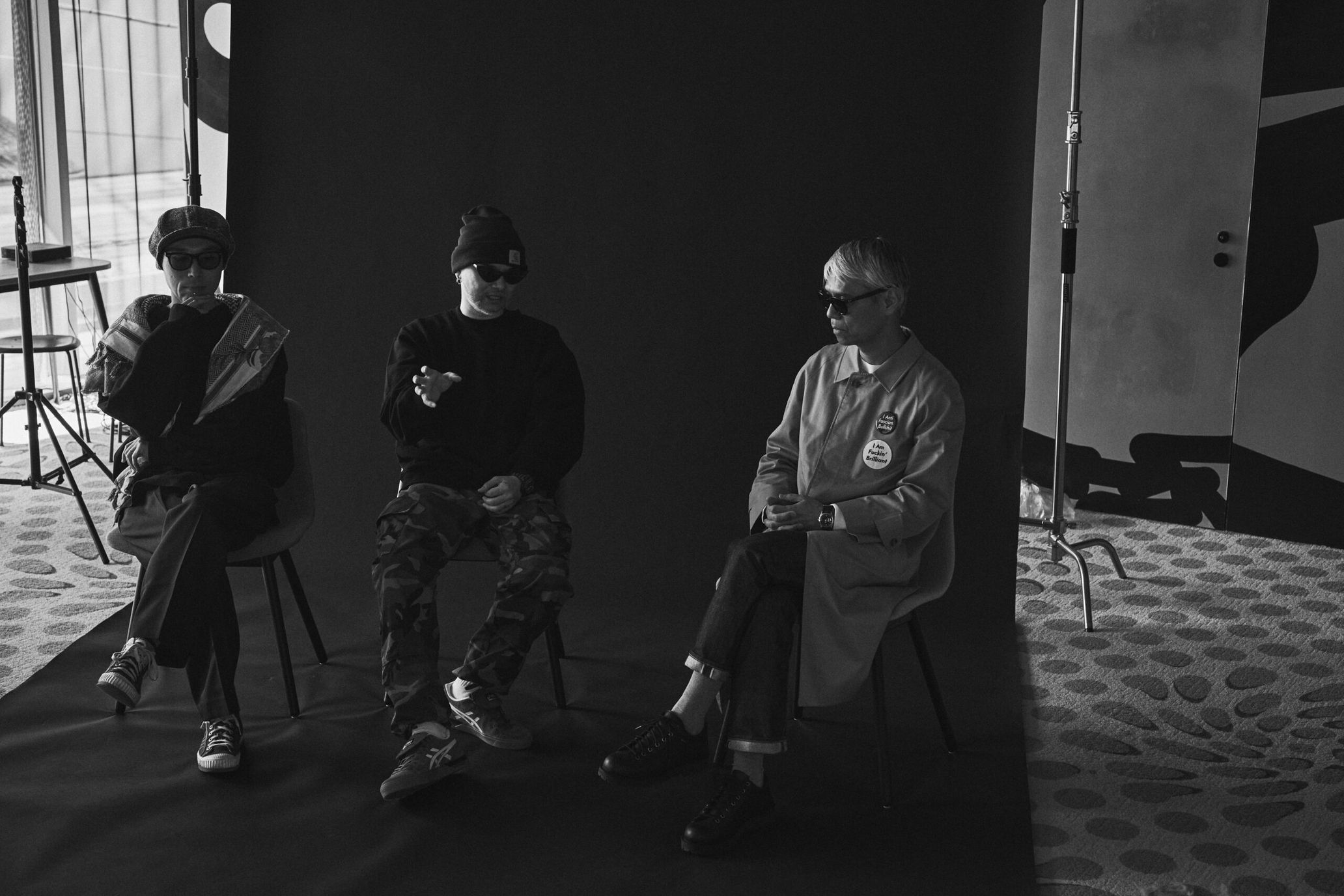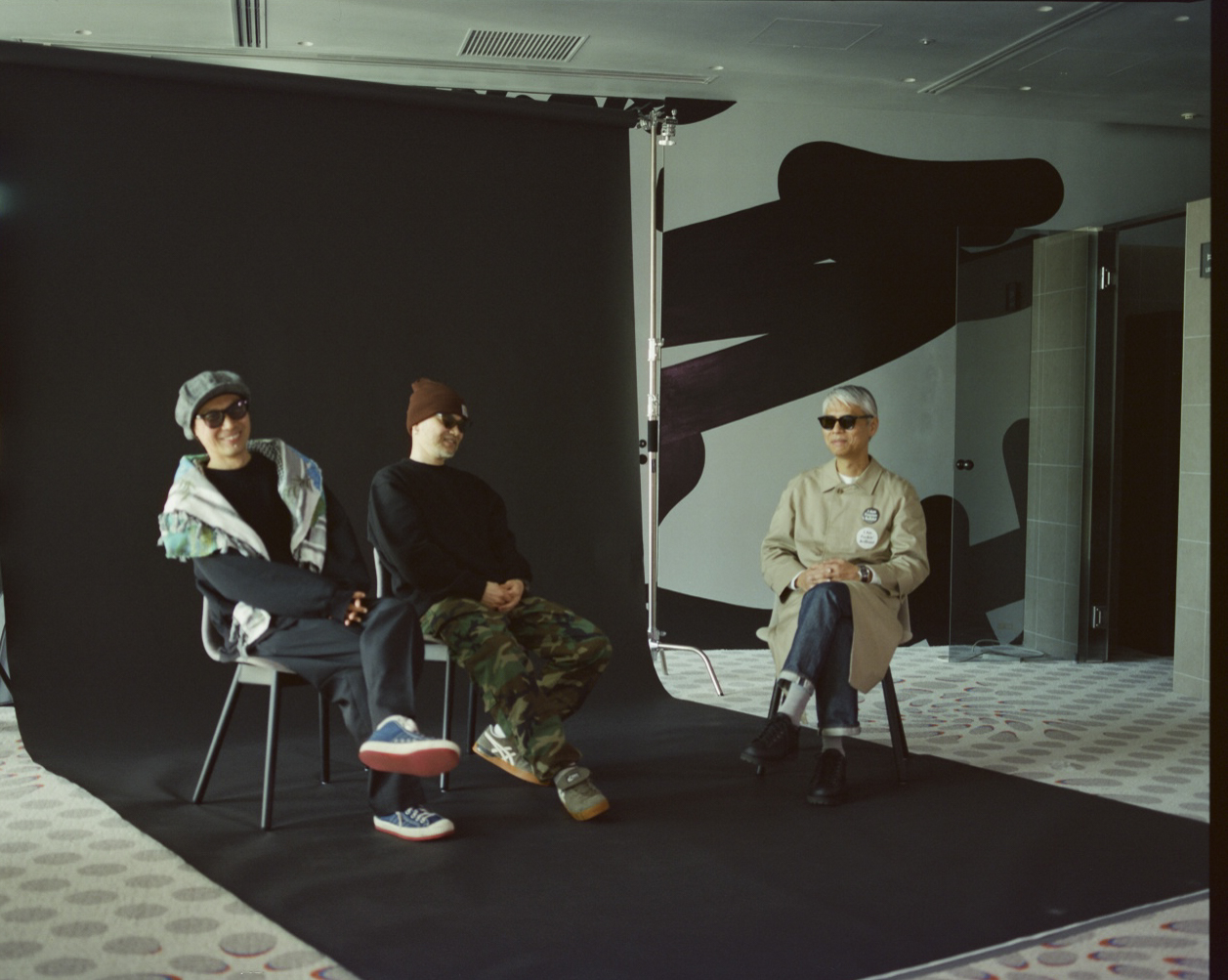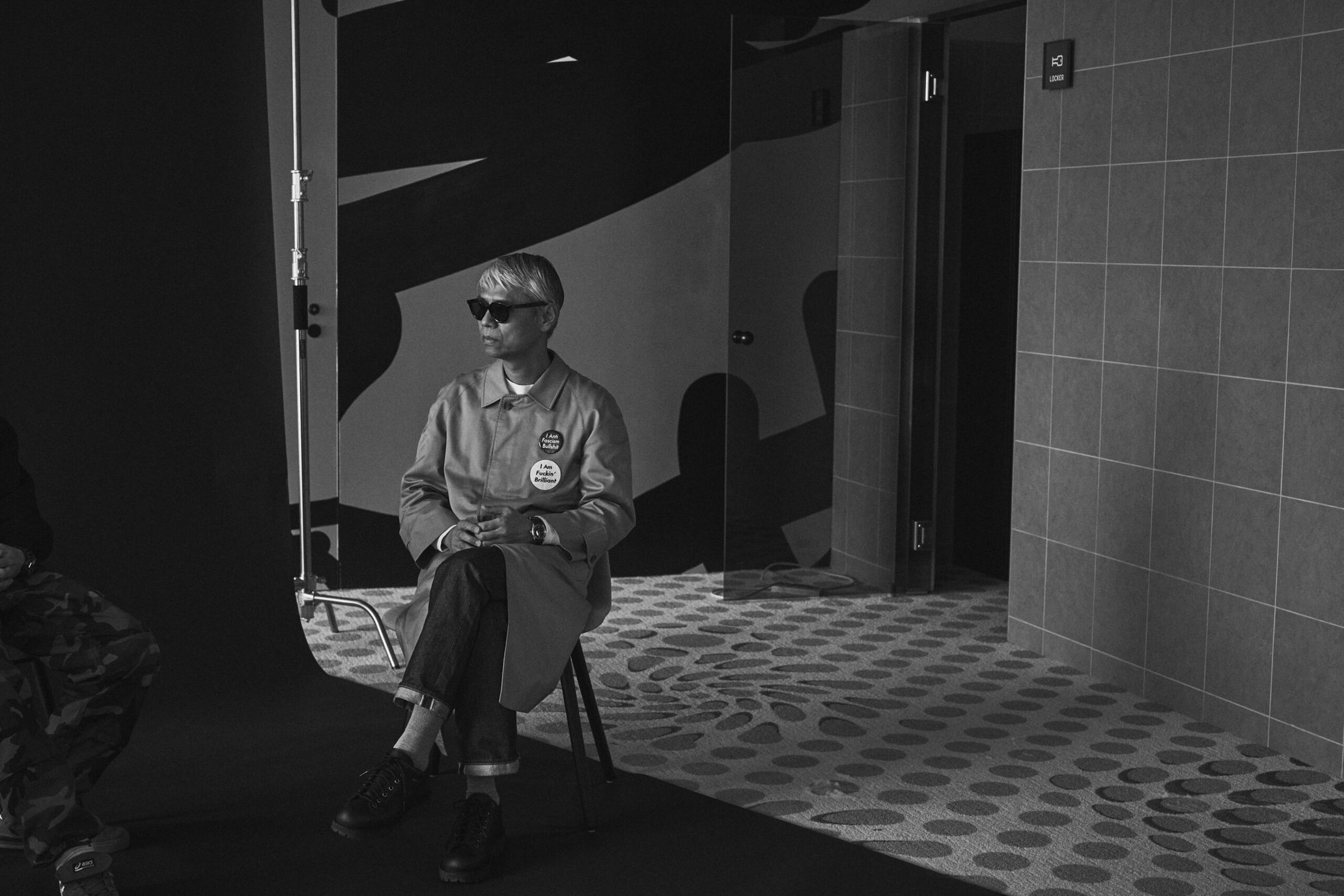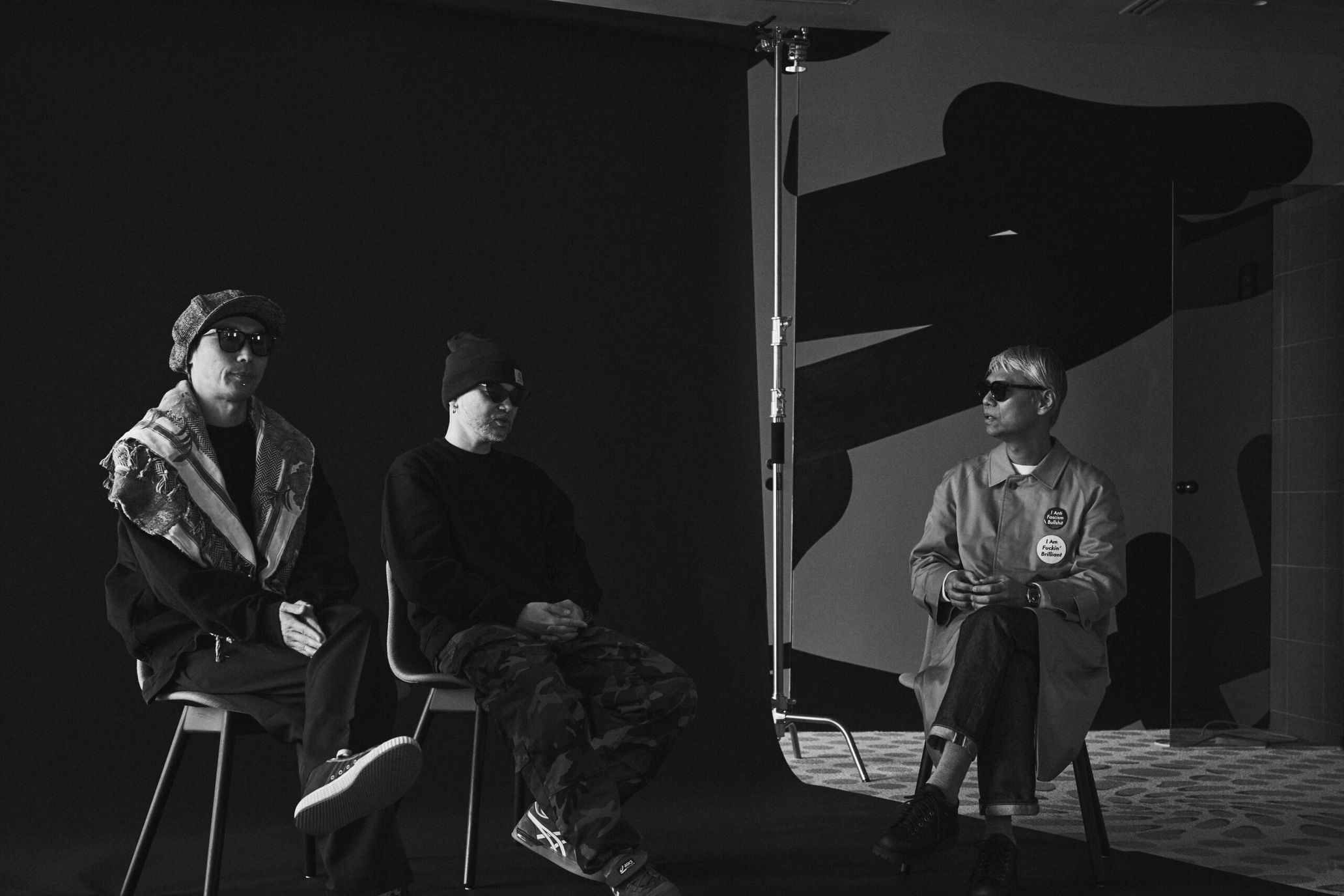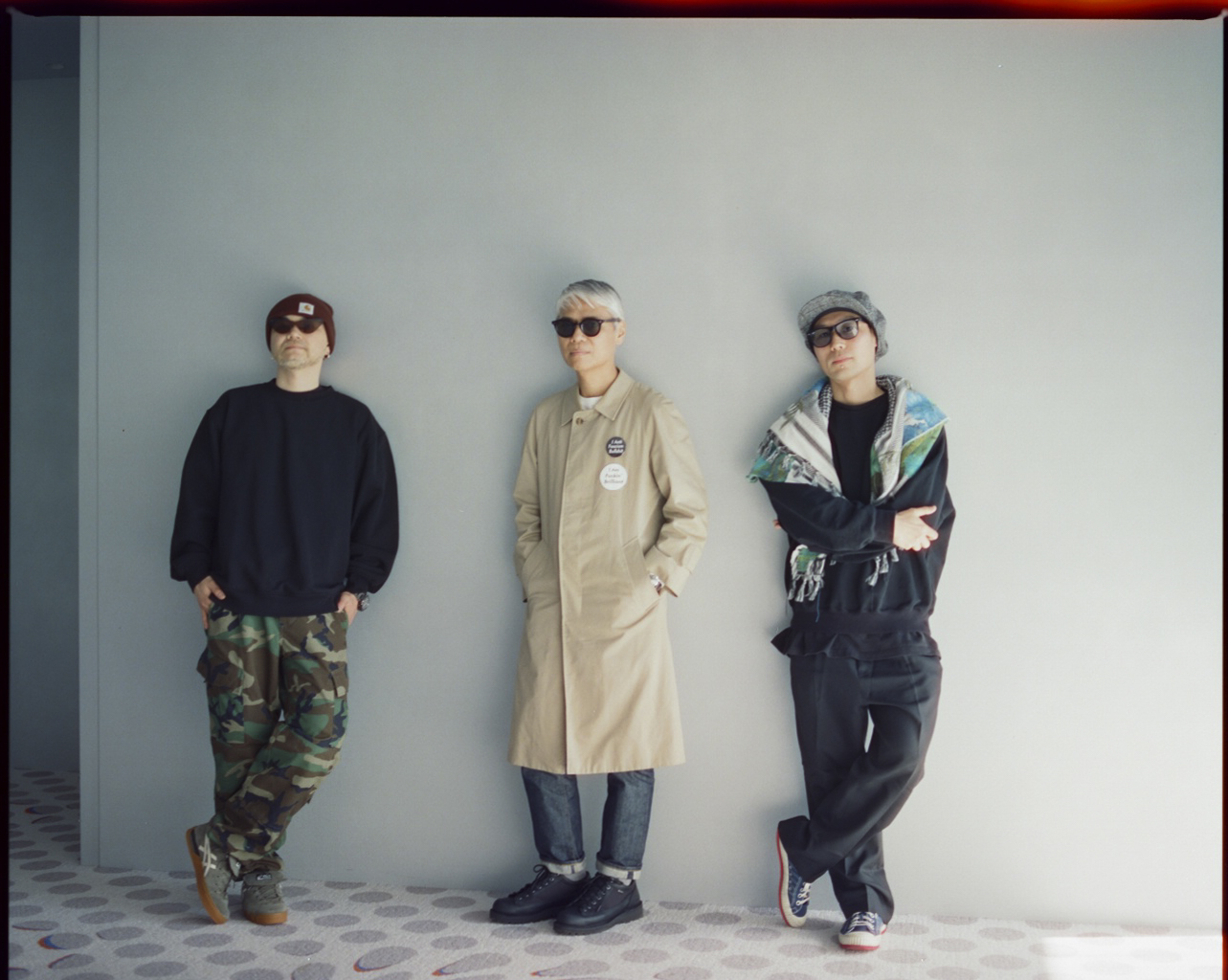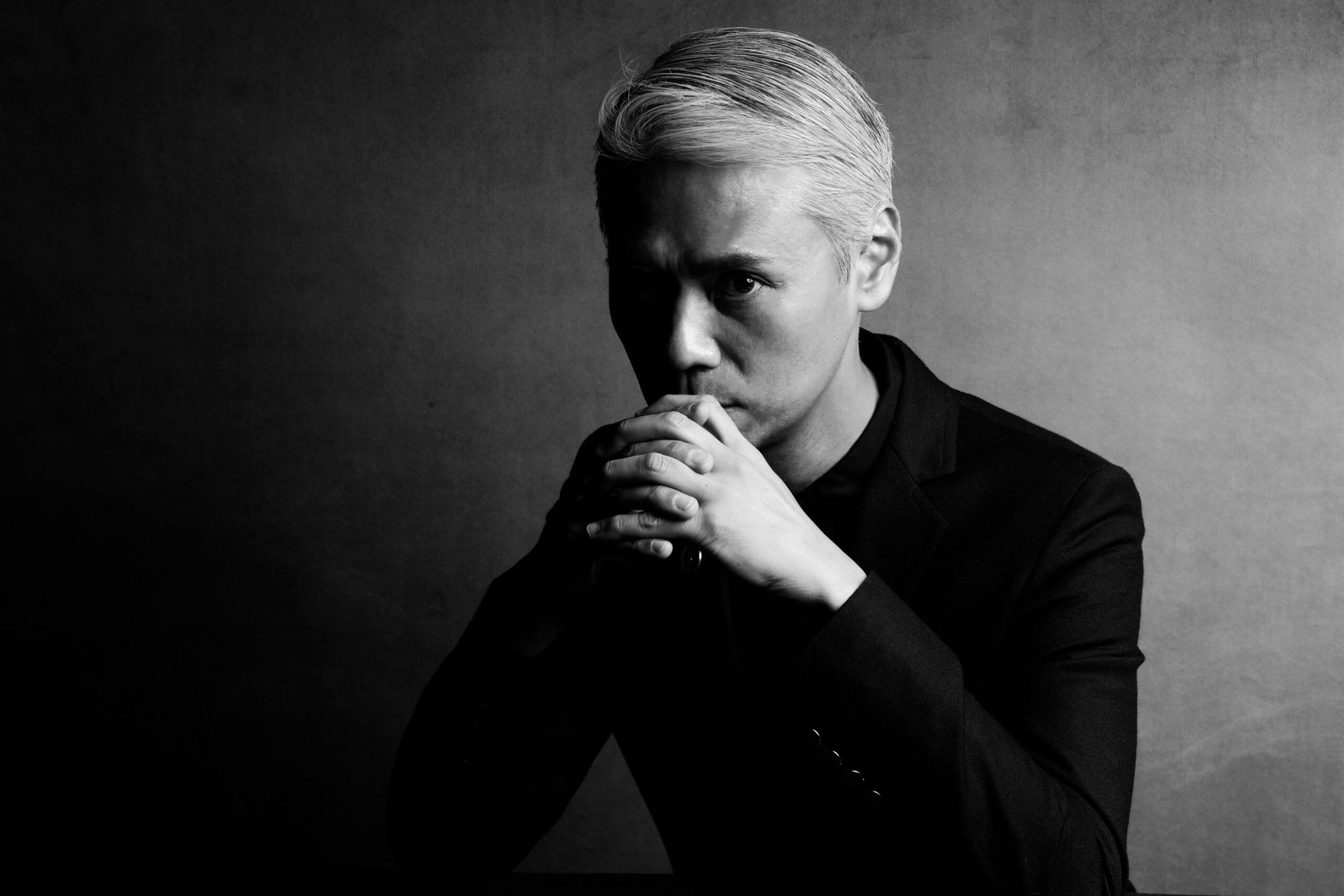This is the third installment of the series by creative collective PKCZ®, comprised of EXILE MAKIDAI, Alan Shirahama, VERBAL, DJ DARUMA, and JOMMY. In the series, the members will be cross talking with global DJs and music producers who captivate their attention, about the current state of the club scene in the pandemic and its future. Discover the future of the club music scene, where the opportunities of physical shows have dwindled dramatically.
Vol. 3 features Shinichi Osawa, who released his new album BIG WORLD in February under the name of MONDO GROSSO. In the second part(part1), we asked him to talk about his lifestyle and episodes associated with the 2000s, the electro music era that the three of them went through.
Rather than reducing the damage livestock farming does to the environment, I amchoosing veganism for the diversity of our diet
DJ DARUMA (DARUMA): Following the stories about your album, please tell us about your lifestyle this time. You co-own the vegan food restaurant “THE NUTS EXCHANGE,” but are you usually a vegan as well?
Shinichi Osawa (Osawa): When I started, I was aiming for 99%, but now I am 95% vegan. 99% means that you have one non-vegan meal out of every 100 meals, but now I am down to one out of every 20 meals, which is 95%. In my case, I’m not a dietary vegan, which refers to a person who adopts a vegan diet on the grounds that it is beneficial to health, but I’m an environmental vegan. I chose veganism to reduce the damage that livestock farming does to the environment, or rather, I am doing it for dietary diversity and to see if there is an alternative to it. That does not mean that I dislike meat eaters or that I am saying “NO” to meat eating. Rather, for example, we should reduce the number of times we eat meat produced in poor conditions and eat only high-quality meat. I am just practicing that. So, even if it is only 1% or 2%, I think it’s good to eat pasture-raised meat in a good condition once every two months, for example. I started “THE NUTS EXCHANGE” because I wanted to do something that would contribute to that kind of thing.
DARUMA:It is true that there are too few choices in Japan. Even in supermarkets, there are people who want to choose organic foods, but it’s hard because it’s relatively expensive.
Osawa: If more people support organic, the price will probably go down, but as with environmental issues, the reason why recycled plastic products are expensive is because they have not penetrated society yet. If that is the case, we will not be able to make progress unless we think of something that many people will pick up, such as something fun that outweighs the price, or something that makes people want it even at this price. No one likes to be patient, and it is no fun.
DARUMA:I am into fasting, and I detox several times a year by fasting. I can feel how light my body and mind is when I am fasting, and I really feel good when some kind of toxins are being released. So I would like to try a vegan lifestyle as well.
Osawa: I think partial veganism is an interesting idea. For example, it is perfectly fine to be vegan once a week or once a month. It may sound strange, but you don’t have to be 100% vegan, 95% or 90% is fine, but the key is how much you can improve the quality of the 5-10% non-vegan diet. I recently had a conversation with the owner of 8ablish, a delicious vegan restaurant in Minami-Aoyama, and we talked about how organic, non-vegan food is much better than a bad vegan meal. Now that veganism has become a business, eating a regular diet with proper organic ingredients is better for your health and the environment than eating genetically modified soybeans.
DARUMA: So the idea is to think about the environment and to eat high quality food as well for your body.
Osawa:Such is the case with greenwashing, isn’t it? Surprisingly, the backgrounds of people who say they don’t use plastic are often business-based, but I still believe it’s better if they are thinking about environmental issues. I’m not a person who believes in everything about environmental issues. No one knows the real answer, and since there are so many interests involved, no one can predict what will happen. Still, taking some action on the environment is not a bad thing, even if it’s a bit of imaginary fears.
I felt something that resembled the initial impulse of when I first started listening to music in Electroclash
DARUMA:From here, we are going to look back on the 2000s.
Osawa: Yeah, let’s do it.
DARUMA:Looking back, what kind of musical journey did you go through to get into the electro music scene?
Osawa: The first time I found the scene interesting was around the time I made NEXT WAVE, which had some electro elements, and I personally regarded it as a bit of a return to new wave, although the album didn’t deal directly with new wave type of music. But one of the artists I was listening to in that context was Benny Benassi. Then he became my favorite, and I contacted him because I wanted to release his work on the REALEYES, a record label that I was working on at Sony Music at the time. As a result, it didn’t work out, but I made a connection with him. As I searched for something similar to this type of music, I found the genre “Electroclash,” which was at the origin of it. It was around the time when labels like INTERNATIONAL DEEJAY GIGOLO and an artist Tiga were just coming up, and from there, I felt something that resembled the initial impulse of when I first started listening to music, or the edge of post-punk, disco-punk, and new wave. So I started playing electroclash mixed with house music myself. But there was no one around me in Japan who was DJing like me, and in my search, I met Ue-chan (Masatoshi Uemura).
JOMMY:I see. How did you meet him?
Osawa: My manager went to Bonjour Records, which had a good selection of Electroclash at the time, and asked, “Is there anyone who knows about Electroclash?” He said, “Our buyer knows a lot about it, and he is also a DJ.” So I went to listen to Ue-chan’s DJ, and it was a complete mess (laughs). When I saw the pitch controller on his mixer, I was like, “You spin that fast? (Laughs). But there were no DJs around me who were doing that, so we became friends and decided to DJ together. That’s how we started OFF THE ROCKER.
DARUMA:Did you start with electroclash and then move on to mashup?
Osawa:Yes. From there, I became friends with Larry Tee. and we started doing events together. Incidentally, Larry T. came up with the term “electro crash” when he was riding in a cab in New York City. He told me that when he was thinking about how to describe what he and his friends were doing, the cab almost caused an accident (=crash) (laugh).
DARUMA:Daft Punk‘s “Human After All” was released in 2005, and in my opinion that was the origin of electro. That album was very rough, wasn’t it? They even confessed they made that album in two weeks. Triggered by that album, the Parisians started to change, and artists from Modular Recordings started to emerge in Australia. In this way, heads all over the world must have vaguely wondered what that movement was. I thought it was strange because it had a rock attitude, mixed with techno and hip-hop, and was also fashionable. Then MASAYA of KITSUNE told me, “We call them electro.” I had always thought of electro as a sound like Afrika Bandataa, so when I heard that, I thought, “Oh, I didn’t know that that’s called electro.” After a while, this type of music was occasionally called something like “new rave,” and after a short period of time when the media around the world were trying to figure out what to call this phenomenon, they collectively decided to call it “electro.” Looking back now, I think the most intense period for electro music was only about two years, though.
Osawa: Indeed, it may have been surprisingly short because of the way it was absorbed into EDM.
DARUMA:During that intense period, I gradually had more and more opportunities to meet Osawa-san on the dance floor, and we even got to DJ together at a number of events. Once again, it was a very rich and interesting time.
Osawa: I also think those days were the most enjoyable for me. I probably drank enough champagne for a lifetime (laughs).
JOMMY:You were sweating a lot (laughs).
OHSAWA: Yeah, we were really sweaty (laughs). At that time, we still had Le Baron de Paris, (the exclusive night club in Minami Aoyama that was closed in 2015) and it was such an enjoyable time.
JOMMY: I have personal memories of those days. There was a club called Velours in Aoyama at the time, and you and Ue-chan were DJing in the event OFF THE ROCKER, and I was the next one. At that time, you were a person who was out of my league, and I felt like I was too far away from you to even say hello. So I was a little nervous and waiting for my turn. But you were kind enough to speak to me, saying “Hey, JOMMY! Are you ready?” I was so happy that I wasn’t ignored. I will never forget it.
Osawa: That’s an exaggeration (laughs). But I knew you, JOMMY. I’m friendly when you actually interact with me.
I was completely anti-EDM
DARUMA:I’ll be honest now, but for us, we were still young in the 2000s, around 30 years old, so we had a rebellious spirit toward Osawa-san. Of course, I respected you, but I was simultaneously thinking, “I’m going to take him down a peg!”
Osawa: I also had that feeling when I was young. We even regarded someone like DEXPISTOLS as rival. We were all improving through friendly competitions, trying to be more exciting than everyone else and do more crazy things. So it was a very good time. In a sense, it was part of being young.
DARUMA:From our point of view, Osawa-san was already writing songs at the time and was one of the first to release them on KITSUNE, so it is true that your works triggered the emergence of young Japanese DTM makers, and a substantial gain in the number of people doing music production. Since then, what DJs created have spread all over the world through EDM.
Osawa: In the 2000s, after I freed myself from the shackles of MONDO GROSSO in the 1990s, I finally started making DJ-like music myself, and activated my solo project under the name of SHINICHI OSAWA when I transferred to a different record label. This coincided with the eve of electro music, and I naturally began to make that kind of music. In terms of electro music, it was generally believed the quality of the sounds made by DJs was rather high.
DARUMA:Yeah, you are right. From there, fidget house and bass music emerged, then dubstep and post-dubstep, and I think the biggest trend of all was the emergence of EDM. How did you see EDM?
Osawa: I was completely anti-EDM. In fact, I even stated that I was anti-EDM. Of course, there are good songs. But as a culture, I felt that if I accepted EDM at that time, I would be denying what I had done up to that point. The club culture I had cultivated up to that point, or more specifically, the rebellious spirit I had developed as an adolescent and the original musical experiences I had had through new wave and post-punk, were completely contrary to EDM.
No matter how far we go, we will always be on the counterculture side, and no matter whether I release music as MONDO GROSSO or not, or how many songs I write for someone else become hits, I will always be on that side. So I felt that I could not let this attitude waver, and I definitely did not want EDM to take the essential part of my work.
DARUMA: What did you dislike about EDM?
Osawa: I think one thing is that EDM has a fixed, scheduled format. The clubs that I knew were the place where everyone got excited together, but they did not involve as many people as EDM did. Even if we could create a cohesive group of people in a certain place, we could not create a general sense of unity that involve an unspecified number of people and make them believe that this is the most popular music. Rather I don’t think there was a need to do so.
However, I feel that EDM is destined to have or even the purpose of EDM is this sense of unity, which is, from our point of view, pointless. We have committed ourselves to club culture by reaching the top of the heap with sounds that were marginalized by Billboard, so we didn’t want to be lumped in with that. Unfortunately, because it fits with the economic purpose of the night clubs, electro and EDM have become totally mixed. I think the people working in the clubs at that time were all struggling. So, without choosing a word, when we looked at people holding champagne in the VIP seats, wearing fashions we did not like, we must have felt that the it was not part of our culture. Nightclubs were overwhelmingly cool places, and people who didn’t look good were not allowed to come in. That was my experience of clubs, and I thought they were gatherings of people who thought they were cool. I was shocked to see that broken.
DARUMA:In that era, nightclubs were no longer the clubs we knew. In Japan, most of the nightclubs that we thought were cool are gone, and the image of a club was one where Top 40 and EDM were playing. Recently, however, I have not been able to go to clubs myself, but I feel that clubs are changing again among young people. More and more people are enjoying clubs in a good way.
Filtration in the COVID pandemic has brought club culture back to its purest state
Osawa: I personally think that it is the filtration caused by the COVID pandemic. It is a rather good trend, and of course it is a shame that clubs are going under, but in a sense, I think that returning to such a pure part of club culture will prolong its life, and it will be possible to restore it.
DARUMA:That’s why I think it’s great that now more and more kids are enjoying clubs in a way that we like. And I totally echo your comments on EDM. Looking back, at a time when I was trying to give a boost to electro culture as one of the person who felt responsible for it, R&B and hip-hop mixed with electro dance music in a strange way, and it didn’t sit well with me anymore. For example, the kind of music that Calvin Harris and Rihanna were doing together, or the ones that Nicki Minaj was creating through incorporating electro elements into her music back then, just didn’t work for me. But now when I listen to them again as pop music, they are insanely amazing (laughs).
JOMMY:(laughs).
DARUMA:After that, I spent some time touring the world to see various festivals, and at “Tomorrow Land” in Belgium, one of the EDM headquarters, I stood in the middle of the dance floor in front of the main stage at peak time on Saturday night, and as Osawa-san was saying, it was just a totally planned harmony. However, if we consider the “EDM” experience to be the combination of lasers, stage sets, dancers, water, flames, fireworks, and of course the DJ’s excitement, and the sense of unity and interlocking of all these elements on a floor filled with tens of thousands of people, then it is an amazing thing in its own right. I felt that the experience of “EDM” was a great one.
Osawa:You’re right, EDM is great entertainment.
DARUMA:I used to listen to EDM from the standpoint of whether it was acceptable music or not, but when I thought about the fact that people in Europe call this experience EDM, EDM became acceptable for me. I thought that people who had never been exposed to dance music before would find this experience very exciting and interesting. So, in terms of expanding the possibility of dance music as a whole, I think EDM has served a very good role.
Osawa: I can agree with that opinion. I rejected EDM because I felt it was somewhat an infringement on club culture, but when I think about how it works as a festival, I rather be able to affirm the value of it. As entertainment, it makes all kinds of people happy, and it is certainly wonderful. It also raises the level of the music scene. I haven’t talked about this kind of thing much in the past, but the time we spent with electro music was a great time. And precisely because we went through that time, I am still making electro music today. I think I might like electro more than I used to. At one time I liked minimal, solid techno sounds, but I think that was in a way a reaction against EDM. Now that EDM is no longer absolutely mainstream and not many people confuse the two, I play electro on the dance floor.
DARUMA:By the way, you were not using headphones when DJing. Why was that?
Osawa:I still hardly use headphones. It’s partly because I don’t connect songs very frequently, and I play songs that I know well, so the tempo sits well with one another. Also, I try not to play songs whose tempo doesn’t fit with another one. When you use headphones while DJing to listen to a different song, you are away from the music that you are playing, and it weakens my passion. I feel as if I’m not on the floor. So I try to avoid using headphones as much as possible. Surprisingly, you can do it if you try (laughs).
DARUMA:We often play new releases that we bought that day, so sometimes it can be the first time we listen to them in full. So it would be difficult for us.
Osawa: Of course if you don’t use headphones, the sound might be messed up. But there is also the possibility that this messed up sound become more interesting. Someone listening to it may think that, “Oh, this is so crazy!” I prefer to play a song I know, but if I make a mistake, I just think that’s alright. For a while, when I was playing only techno as a reaction to EDM, I thought I had to do it right, so I often used headphones. But recently I’m getting tired of it again. I hardly ever used headphones when I was playing electro music. Since I enjoyed unexpected happenings at the venue more, there were times when I was doing everything wrong, letting anything can happen, making a messed up mixings or looping the sound to finish the set. Now I’m back to that attitude, and when it comes to DJing, I feel like I have the same messy feeling I had when I was doing electro.
DARUMA:I would love to work with you again in the future if there is a chance.
JOMMY:I’m desperate for working with you too.
Osawa: Let’s have an electro revival night (laughs). But people are talking about something like electro 2.0 is coming again, aren’t they?
I still can’t forget that Osawa-san was silently playing techno, as if to say “I would never go to that side”
DARUMA: What does the counterculture you mentioned earlier mean to you?
Osawa: I think it is a rebellion against the mainstream. The purpose of mainstream culture, no matter how far it goes, is to please the majority or the unspecified majority of people, but there are people who do not find joy in that. This was especially true when I was in junior high school. For example, when I was into YMO, there were not many junior high school students around me who were listening to YMO. Moreover, I liked the geeky stuff among the likes of YMO. Then I was the only one in my class who likes it. I think diversity is a culture that has something for people like me, and I have always been on the counter side against the mainstream since then. I have always wanted to be on the minority side because I have believed it leads to create more options. I have no desire at all to turn this power relationship upside down and be on the mainstream side. It may sound strange, because I belong to a major label and make music, however, no matter how far I go, my place is on the counter side, and belonging to that culture is also good to keep my mental health. I choosing to isolate myself, and therefore, I am not complaining about anything.
DARUMA:I once saw Osawa-san silently playing techno on a dark dance floor at a time when the world was delirious with fever of EDM, and I remember that moment well. At that moment, all my youthful spirit of resistance towards you was gone, and I thought, “I can really respect this guy!” I still can’t forget that performance. You were literally fighting. You were like, “I would never go to that side!” All my feelings for you turned into respect.
JOMMY:I am personally very encouraged by the fact that you have always maintained such an attitude.
DARUMA:I hope you will always keep that stance.
JOMMY:I really hope so.
MONDO GROSSO
Solo project by Shinichi Osawa, musician, composer, DJ, and producer. Formed in Kyoto in 1991 as a band, MONDO GROSSO made its major debut in 1993, and remained active as a band until 1996. During that period, the band made a Europe tour in the middle of a worldwide acid jazz fad. After 1996, it became a solo project of Shinichi Osawa. After releasing albums such as MG4 (2000) which includes “LIFE feat. bird” and NEXT WAVE (2002) which includes “Everything Needs Love feat. BoA, the project took a hiatus. In 2017, the project released its first album in 14 years, 何度でも新しく生まれる (“Born anew, no matter how many times”), and in 2021, “MONDO GROSSO OFFICIAL BEST” that traces the 30-year history of the project. His latest work, “BIG WORLD,” features transformative collaborations with leading artists, including “IN THIS WORLD” with Ryuichi Sakamoto and Hikari Mitsushima.
https://mondogrosso.com
Twitter:@MONDOGROSSO_JP
Instagram:@mondo_grosso
Photography Ryu Amon
Text Kana Yoshioka
Translation Shinichiro Sato(TOKION)

